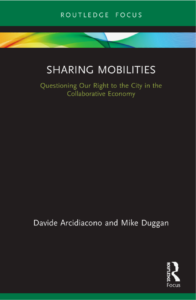We’re pleased to announce the release of DDH’s Dr Michael Duggan and the University of Catania’s Davide Arcidiacono’s new book Sharing Mobilities: Questioning Our Right to the City in the Collaborative Economy (Routledge, 2019).
Sharing Mobilities can be acquired from Routledge.

Shared forms of mobility mediated by digital technologies, which include carsharing, ridesharing, bikesharing and scootersharing, are increasingly common in urban centres around the world. In many places they are rapidly reshaping urban mobilities in ways that present a serious challenge to well established mobility patterns, working practices, transit systems and transportation regulations. This book provides an introduction to, and a historical and contemporary mapping of, the kinds of services available and the contexts in which they have emerged and operate. Grounded in a sociological analysis of sharing mobilities, the book provides an up to date evaluation and critique of the impact that these services are having with regard to everyday urban mobilities, working practices and transportation policy. Framed by the notion that urban citizens should have a right to shared forms of mobility in order to address the pressing issues of mobility (in)justice, the book brings together primary and secondary data from around the world to argue that sharing mobility has the potential to reshape shared urban mobility as a sustainable and socially just practice through the development of socially driven platforms that prioritise reciprocity and community development. Nonetheless, the book argues that this potential is unlikely to be realised if we do not move away from the pervasive models of technologically determined disruption that prioritise rapid growth and individualised forms of consumption that currently dominate the sector. Ultimately, Sharing Mobilities outlines and critiques the current state of shared mobilities around the world and offers recommendations as to how it’s potential could be realised. As such it will provide a useful introduction to the topic for academics, policy makers and technologists working in fields ranging from urban planning and transportation policy to urban sociology, mobility studies and digital geography.
